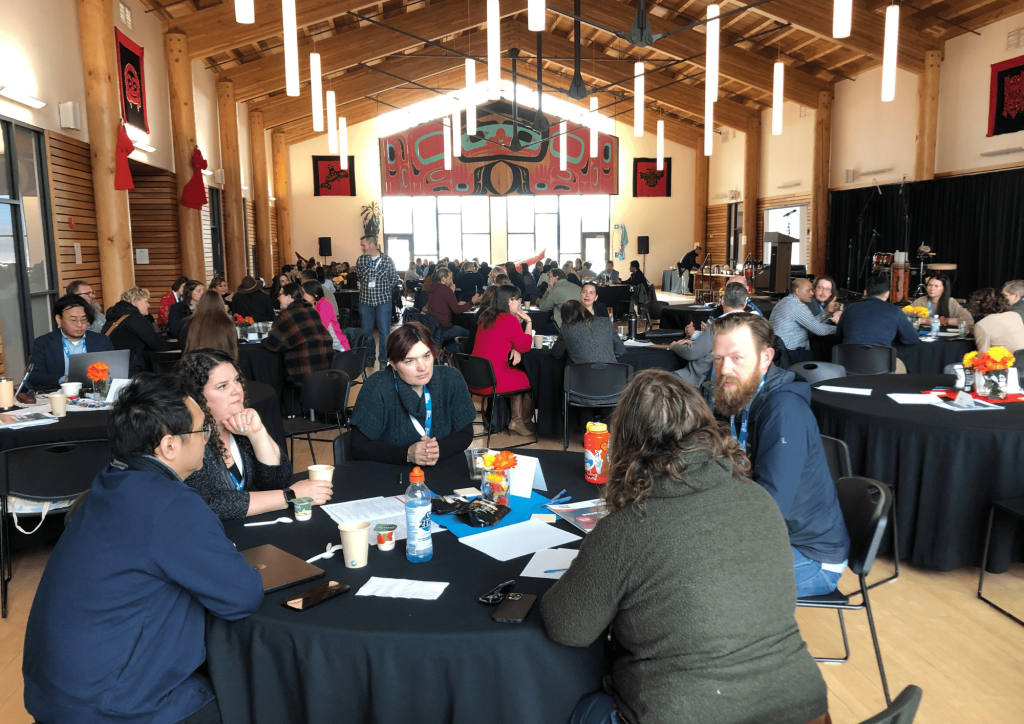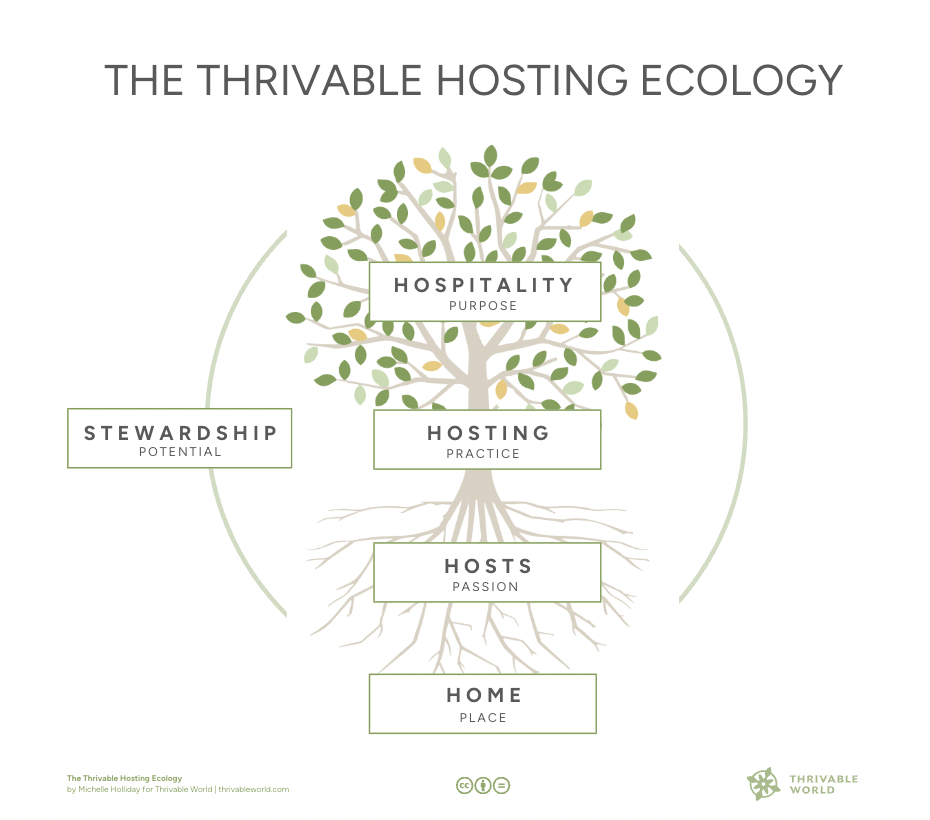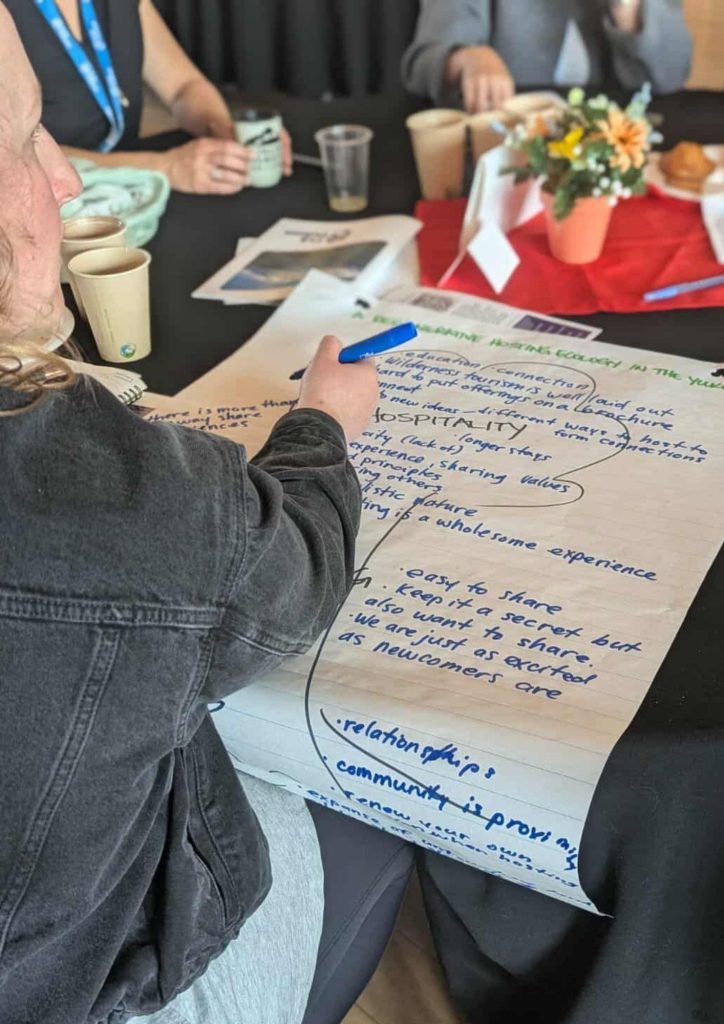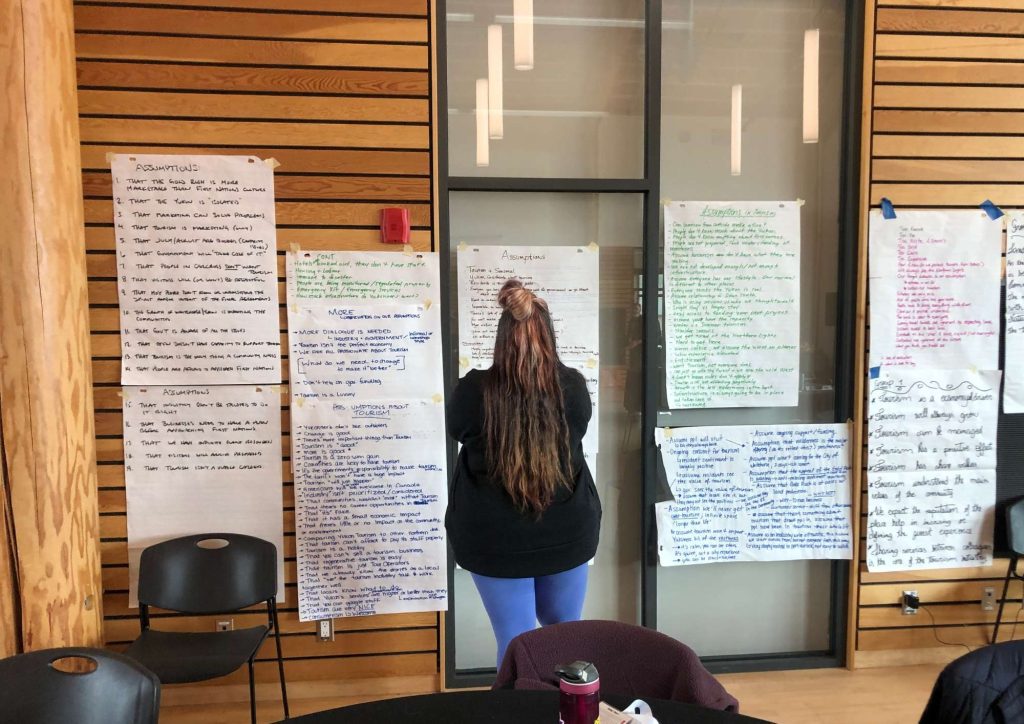It took nearly a year and an almost insurmountable level of courage and vision for the Tourism Industry Association of the Yukon’s Julia Heiroth to put together a very different kind of annual tourism conference.
“I crafted it differently on purpose,” Julia later explained, “to invite a new kind of conversation, one that asks us to look at tourism, community, and the future itself through a regenerative lens: a future where life thrives, not just business.”
In place of the usual line-up of entertaining speakers and business tips and tricks, it was to be a lively, engaging two-day dialogue to discern the state of the Yukon tourism sector and of the community, broadly defined. The common understanding that resulted could then inform a wise, sector-wide strategy. In all, the invitation was to join together as stewards, tending to the wellbeing of people and place in the interest of greater resilience and thrivability for all.
Several months into her planning, I was thrilled to receive an invitation from Julia to help shape the gathering and to offer guidance and facilitation during the event. Now, in the weeks after what was indeed a powerful gathering, I want to share some of my observations about the experience. This kind of convening is still incredibly rare, though I believe it is needed in every community where there are guests and hosts. My hope is that the detailed reflections below will offer inspiration to others who may be waiting for the encouragement that a pioneering example provides.
Language matters
First, we were very thoughtful about the description of the event and the nature of the invitation, hoping to set the tone from the first interaction. For the most part, this meant setting aside offers of best practices and guarantees of “what you’ll leave with.” It meant moving away from the unquestioned pursuit of industry growth in isolation of other factors. Instead, the invitation painted an evocative picture:
Tourism isn’t just about where we go—it’s about how we host and connect.
This year’s gathering will explore how hosting—in the broadest sense—shapes community resilience, well-being, and our shared future. In this context, hosting goes beyond tourism to include the way we welcome, nourish, and sustain each other, our land, and new possibilities.
Together, we’ll reimagine tourism not just as an industry—but as a way to host and sustain a future we all want to be part of.
This framing felt risky: will people come?? But it also felt exciting: how could they resist?? It called for trust that those who were open to such a conversation would be drawn to it, perhaps feeling relief that, at last, someone had dared to name such a need and opportunity. And it required acceptance that this wouldn’t be for everyone and that other offerings were available to meet other needs at other times.
Never host alone
Three heads are better – and braver – than one. I suggested that we add a third to our team, preferably a man, someone local, grounded and practical. That isn’t a suggestion I’ve made in other contexts. But here, I felt it would be helpful. I knew I would be coming from away, bringing abstract concepts, and I wanted to balance that out. Julia found the perfect complement in Michael Pealow, with his flannel-and-jeans demeanor and his deep experience working with First Nations, government, economic development and community consultation across the Yukon. Our little trio was an absolute joy to be part of. And we were a microcosm and model of the kind of attunement, collaboration and responsiveness we were inviting people to embrace.
Seek out diverse voices
Beyond our core team, Julia understood that it would be important to integrate views from across the sector and beyond – before, during and after the event. In the context of the Yukon it was clear that First Nations’ perspectives and partnership, in particular, were critical to the conversation. That was reflected in conversations leading up to the event and in the agenda.
This was not about representation for its own sake. It was about growing in collective awareness, maturity and capability in order to enable necessary change. As the Australian Aboriginal activist saying goes: “if you have come because your liberation is bound up with mine, then let us work together.” Such an intention and approach takes time, sensitivity, commitment and adaptability.
At the same time, full representation and partnership from the very start is impossible. I’ve seen too many groups stall as they discount their own validity because of who is not in the room. Instead, as Margaret Wheatley says, we “start anywhere and follow it everywhere.”
Gather differently
If we wanted to have a different kind of conversation, and if we wanted different—better—outcomes, it was also clear that we needed to gather differently.
For example, the conference was held at Haa Shagóon Hídi, a stunning Carcross Tagish First Nation cultural center, in a community outside the capital city. We began in a large standing circle around the outdoor fire pit, guided in a ceremonial welcome by Colleen (Wolf Mother) James. Throughout the two days, people were invited to move from table to table to engage with different perspectives, gradually sensing the emergent collective story. Lunch on the first day was capped by an energizing and thought-provoking drumming activity. Massage and reflexology treatments were available by appointment throughout the two days.
If “the medium is the message,” then all of these conference features communicated that this was a fully human endeavor. Our heads, our hearts, our bodies and our collective insights were needed to access the full wisdom we were seeking.
Take more into account
In all these ways, we created the conditions for people not only to look at their own work, not only to consider their own experience and interests, but also to take in the peripheral view: what is happening around you?
Quoting a paper I co-authored for Destination Canada on “Regenerative Approaches to Tourism,” I suggested that, given the many crises we face:
“The situation is so dire, we need every sector to lay down their tools, turn to the world, and say: ‘these are our skills and resources; how can we help?’”
Through inspiring stories from Canada and around the world, I offered assurance that there is also a beautiful opportunity to create something new and better together.
Hosting the hosts
Either way you look at it—dire situation or beautiful opportunity—there seems to be widespread consensus that those working in tourism have a vital role to play.
What we sought to make clear at the conference is that the most powerful leverage point is not changing the tourist in some way; it is leaning into the role tourism professionals play (or could play) in their own communities.
As I shared in the Yukon, the trendy new concept of regenerative tourism is actually a call for healing, the deeper meaning of the word “regeneration.” What needs to be healed is people and place. It is us, our societies, and our natural ecosystems. And this isn’t the tourist’s responsibility, or even possibility, to heal us. Instead, it’s something we must take on together at local levels. The work of regenerative tourism, therefore, is to become a regenerative host community – a community that has the commitment and capacity to regenerate itself continuously.
The necessary work, then, is to host each other and our collective potential. It’s to come together around project after project, responding together to issues and opportunities in ways that are unique to this place. As the stories I shared illustrated, such regeneration happens through a connected, cohesive, engaged community.
And this doesn’t happen by itself. Becoming a connected, cohesive, engaged community happens when a small number of caring people are willing to bring others together – to “host the hosts.” Following Julia’s example, it takes some thoughtful group to step forward and say: We will hold this broader view and bigger story of healing and regeneration. We will ask bolder questions about what matters most and what is truly needed. We will find the courage to hold meaningful conversations and to gather the community in novel ways. We will support collaboration, transformation and celebration, growing a culture of shared learning, curiosity and change.
Not everyone in a community has to do this work of stewarding regeneration. But some must.
And importantly, people who work in tourism are uniquely positioned to play this role. They are so often wonderfully creative. They know how to make things happen. They are generally warm people who love their community and are natural hosts and conveners. Their work is connected to everything in a community—to commerce, culture, history, infrastructure, government, and more. What they do is grounded in things all residents care about in their shared home. How many sectors can claim all of these things?
The hosting ecology
In this work of hosting the hosts, it is essential to go beyond the survey, beyond consultation, beyond simply asking peers and residents: “what do you want tourism to do for you?”
If we are to support new projects and new possibilities – if we are to enable ongoing, unfolding healing of people and place – we must tend to the full “hosting ecology.”
To illustrate this concept, I offered the metaphor of a tree, in which:
- The soil represents our shared Home, the place that holds us, shapes us, informs us.
- The roots represent us as passionate Hosts, in all our diversity of resources, contributions and needs.
- The trunk represents the relationships, interactions and infrastructure that support and connect us in the practice of Hosting each other, as well as guests.
- The leaves, branches and fruit represent our outreach and offering — the purpose that unites us within a project, an organization or a community. Ultimately, they represent the experience of Hospitality that we create together.
This is the fullness of what we are stewarding. In place of the dominant view of a destination as something to be managed, as if it were a simple mechanical conveyor belt, instead we see a dynamic, interdependent ecology that can’t be controlled but can be cultivated, in a spirit of participation, service, learning and responsiveness. The work of stewardship is to enable the emergent expression of potential that can only happen in this place, with these people, in service of the real needs of this moment.
Taking such a holistic view means that we’re aiming for more benefit for more of the system. In fact, I pointed out that the word hospitality shares the same root as hospital and hospice. There is something healing in being well hosted and in hosting well. If it’s done well, an offering of hospitality generates some new level of harmony and wholeness. In an absurdly simple example, I shared the story of how the Destination Management Organization in Stratford, Ontario, brought residents and partners together around expansion of a downtown public washroom in ways that left the community more connected, more creative and more capable, with a washroom that reflects the particular culture and spirit of Stratford and rippling economic and social benefits. Any project can have such an effect if we make that our collective intention and practice.
Mapping your hosting ecology
At the conference, we invited participants to imagine together what a regenerative hosting ecology in the Yukon might look like – and what it might require. Sixteen tables of five or six people each got a flip chart with a tree drawn on it, where they were invited to make notes from their conversation.
At first, people struggled with this, even with all the engagement leading up to it. For many, it seemed new to think in terms of the whole system rather than solely their own needs and opportunities, or rather than primarily the tourist’s wants and trends. Later, one man told me he found the exercise more “cerebral” than he was used to. But we encouraged them to keep at it. And gradually, through conversation, they started to break through to insights and understanding.
After 45 minutes, each table shared brief reflections with the whole group.
At the broadest level, the exercise brought to the surface “the absence of real support and strategy for tourism in the Yukon” and “the need for a dynamic, responsive strategy to make it a better place for all.” It sparked calls for an approach grounded in “learning” and “creativity,” where “we manage the competing visions of the future and we’re proactive about what that should look like.”
One table reiterated that the tourism sector is uniquely positioned to be a force for regeneration. “We don’t have time to wait. We need everyone to step up. We don’t have to tear down everything but we do have to question everything. This is not a check-box activity.”
“We need to go beyond conversation about tourism and work together with community,” shared another group. We need to “look at what changes we’ve experienced and look to the future together.”
As another table put it: “There’s a need to persevere through the discomfort of confronting contradictions, paradoxes and assumptions that are at least partly wrong. We can’t be afraid of making mistakes.”
One group ventured a suggestion: “Maybe a ‘community first’ or ‘community-centered’ or ‘community led’ hosting ecology is easier to understand than ‘regenerative.’ What if we see ourselves as community developers?”
Some spoke of the “need to expand the narrative” that characterizes their shared Home. “We need to walk away from a single narrative and include all the people who make up the Yukon.” In particular, there seemed to be consensus around the need for more focus on the place of First Nations.
As Hosts, there was a strong call “to support our personal wellbeing and resilience,” particularly after hearing many stories of overwhelm and burnout throughout the two days. “This mirrors what the visitor needs,” shared one group. “How can we offer [wellbeing] to them if we don’t experience it for ourselves?”
I was encouraged to hear one group acknowledge that this need for self-care is heightened as we open up to new assumptions, relationships, attitudes and actions. The work of tending the hosting ecology in new ways requires self-reflection and mental flexibility. “We need to be able to pause and offer ourselves grace. We need time and space to slow down,” they observed.
In all, the need for connection – what I would call practices of Hosting – was the strongest theme throughout the two days as well as in this exercise. “Relationships drive the sector, drive the story, enable collaboration. But now, we’re operating in silos (and even in competition).” There was a call for more regular communication and for more partnership with First Nations. This will require “difficult conversations about reconciliation and the negatives of the gold rush,” some pointed out
People acknowledged that this also includes relationships within the broader community, extending across the nearby US border. And it includes the relationship with visitors (“for example: educating them about how to care for this place”).
“All of this requires being aware of what is happening around you. And it requires accountability from everyone,” said one group.
Near the end, one table spoke with blunt honesty: “We struggled a lot with this. And then we realized that this conversation needs more time and more people at the table. It’s bigger than us. It needs the support of a network.”
They suggested that such a network “could start by supporting a tiny pilot project in a way that embodies what’s being discussed.” I couldn’t agree more.
Looking through the flip charts after the conference, I could see that no single group had come up with the whole picture of the hosting ecology or its regenerative future. No single image of the tree held the complete story. But by putting all 16 of them together, a clear, cohesive vision and mandate starts to come into view. We have to look at the forest, not only the trees.
In that vision of the future, people and businesses are “each stronger with others,” “nourished by real connections with ourselves, visitors, and community.” As hosts, people are “able to be authentic, not prescribed,” even as they have “a sense of shared identity.” “There’s more than one way to share this experience. There are different ways to host connections.” People are guided by shared values, and that “creates a sense of purpose” and “contagious passion.”
Within this vision, the connection and collaboration “creates good ‘soil’ to develop and leverage infrastructure,’ ‘growing enough capacity.” “We’re making a better place, or at least aiming to.” “We inspire others. And we feel hope.”
This is a vision of a new level of Hospitality: “Once you step foot on the ground, you feel the connection. The spell of the Yukon.” “Visitors stay longer.” “Visiting is a wholesome experience.”
As the conversation continues after the conference, I wonder what broadened vision of Hospitality will come into view. What will this community choose to invite visitors to “rush” to the Yukon for in the future? What is the treasure that can only be found in the Yukon, the new “gold” that responds to the needs of these times? What would Yukoners love for people to take away, and leave behind, in a reciprocal pattern of health and healing? This conference seemed to be an important step towards answering those questions. The conversations that follow will determine how the answers come to life.
In the short term, away from the potent space we created together and without the view of the forest rather than the trees, there have been the voices of some who wished for the usual conference experience. That is to be expected.
But these times call for conversations that can only happen when an entire hosting ecology is represented in one room. They call for insights that only come into view when we weave together these many vantage points. There are things that only become possible when many of us discover what we care about and what is needed most. There are questions that can only be asked within the soil of relationship. It makes a difference that we share some meals together, that we share stories, that we show up in more of our full humanity. Our own courage doesn’t come to the surface at the first invitation. It needs to be coaxed, explored and convinced in the context of what matters more than our fear.
All of this is the deeper power of hospitality.
“Personally, I’m proud,” Julia shared after the gathering. “Proud to have been able to create something authentic and future-facing, rooted in the belief that change is possible when we’re willing to see things differently and work towards it, even if the path is still uncertain.
I hope this is just the beginning: a shared journey of re-imagining what tourism can be — together, thoughtfully, and with care for the place we all call home.”
And I hope that this is just the beginning of a wave of such conversations across Canada, and beyond.









Have you read of Moratorium Retreats in Conche, NL? Very interesting example of this.
Thanks for bringing Moratorium Retreats to my attention – I hadn’t heard of them! Here’s a link: https://moratoriumretreats.com/